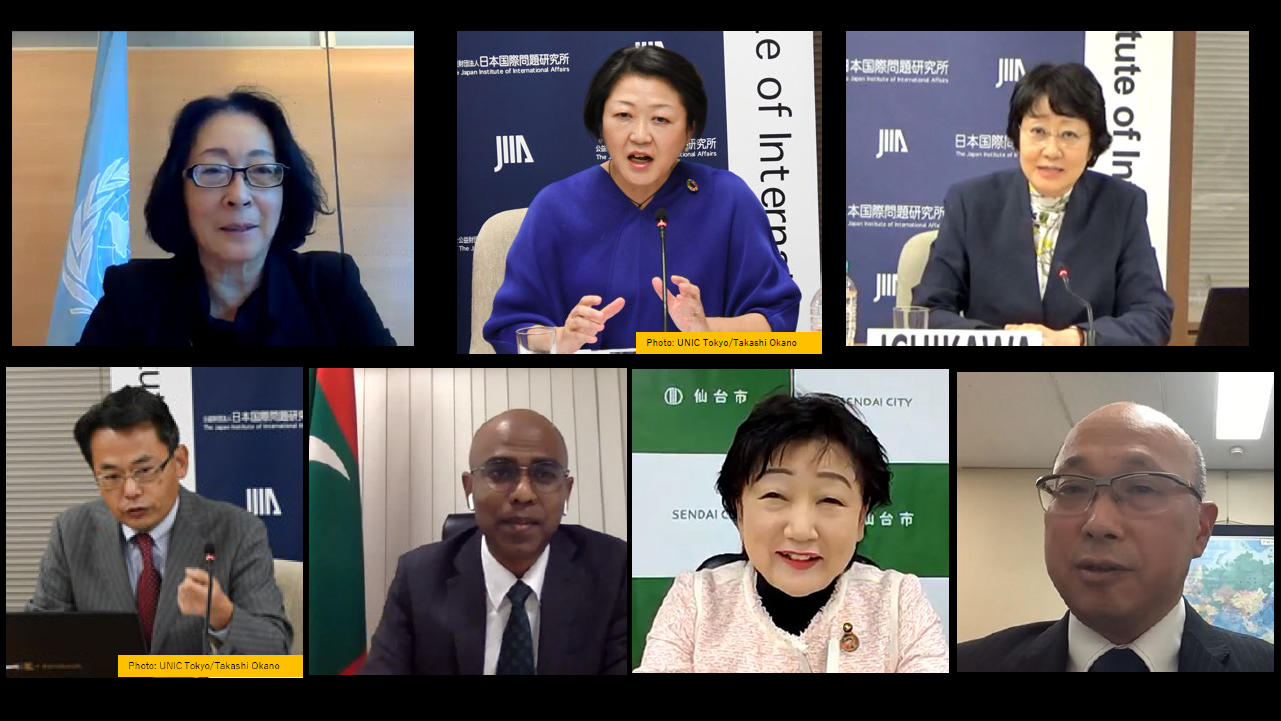The Japan Institute of International Affairs (JIIA), the United Nations Information Centre, Tokyo (UNIC Tokyo), the United Nations Office for Disaster Risk Reduction (UNDRR) Office in Japan, and the Ministry of Foreign Affairs of Japan (MOFA) co-hosted an open webinar entitled "Disaster Risk Reduction from Today into the Future: SDGs/Climate Change Perspectives and Japan's Leadership" on 19 October 2021.
Japan and the rest of the world have been facing increasingly severe and frequent climate-related hazards in recent years due to climate change, infectious diseases such as COVID-19, and compound disasters. This underlines the increasing importance of disaster risk reduction efforts based on a comprehensive and integrated approach. Furthermore, disaster risk reduction is a significant area of focus in Japan's diplomatic efforts, for which Japan can leverage the knowledge, experience, and technology it has garnered over a long history of battling disasters.
Practitioners and experts active at the forefront of their fields participated in the webinar, where they engaged in active discussions on the future of disaster risk reduction. They discussed the ways in which Japan can demonstrate its continued leadership within the international community going forward from a broad perspective, based on the interrelationships between the SDGs, climate change and disaster risk reduction.
The opening remarks by Tomiko Ichikawa, Director General of The Japan Institute of International Affairs, were followed by a keynote speech entitled "Building Global Resilience - the Sendai Framework for Disaster Risk Reduction, Achievement of the SDGs and Expectations for Japan" by Mami Mizutori, Special Representative of the United Nations Secretary-General (SRSG) for Disaster Risk Reduction and Head of the UNDRR. SRSG Mizutori asserted that disasters cause enormous damage to people's lives, that a sustainable society cannot be realized without resilience, that stronger disaster reduction policies and governance are needed to adapt to increasing intensity and frequency of climate-related hazards, and that a coherent and integrated approach of disaster risk reduction, climate change countermeasures and sustainable development is needed. She then discussed investment in disaster risk reduction for a new era, the promotion of international cooperation, and the importance and expectations of Japan's leadership. The keynote speech was followed on the agenda by presentations from the event's panelists. Keiichi Hara, Deputy Assistant Minister/Deputy Director-General for Global Issues at the MOFA, presented on the topic of Japan's international cooperation. Ibrahim Uvais, Ambassador Extraordinary and Plenipotentiary of the Republic of Maldives to Japan, shared the experiences of the Maldives, as a Pacific island country. Kazuko Kori, Mayor of Sendai City, shared the efforts that have taken Sendai City from restoration/reconstruction to recognition as a Disaster-Resilient and Environmentally-Friendly City. Mikio Ishiwatari, Visiting Professor at The University of Tokyo, presented on the estimation of the effects of disaster risk reduction investment. The panel was moderated by Kaoru Nemoto, Director of the UNIC Tokyo. The ensuing discussions were very lively, and included comments from SRSG Mizutori on each presentation topic as well as responses to questions posed by viewers.
Watch the Event ▶ https://youtu.be/Jfckxi6VdfM



